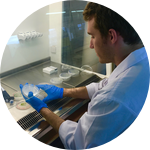The reward for your contribution
I have spent several months trying to figure out the best way to recognize and thank the people who had donated to the crowdfunding experiment. I thought of several ideas in the past, such as givin...
Proinsulin expression was not detected, but recombinant GFP successfully expressed from MSX constructs
We were still unable to detect the expression of recombinant proinsulin in chlamydomonas from our pAsapI construct, despite the fact that the construct seemed to have successfully integrated into t...
The proinsulin gene was positively detected in our transformed algae using genotyping PCR
We were finally able to detect the algae proinsulin gene. We had re-cultured the emergent transformed microalgal colonies on minimal media to ensure that the colonies contained our pASapI-proinsuli...
Quick New Years Update
It has been an eventful 2016, to say the least. On the technical side, we were able to transform an antibiotic resistance marker successfully into microalgae (pictured below). Unfor...
Major IndieBio update, First visible colonies from pASapI-aada algal transformation experiment, and a positive colony PCR product.
When we began the IndieBio EU accelerator program, we started experimental work immediately. With the proinsulin and spectinomycin resistance cassettes successfully constructed by Sebastian, and tw...
Completion of more E. coli expression work, paving the way for algal transformation work.
Last week, we reached another milestone. We were able to successfully confirm that our modular expression system (derived from the pASapI plasmid) is indeed functional, and working well in E. coli....
We are officially in the IndieBio accelerator program!
Thanks to the amazing support and enthusiasm we received from the community through the Experiment.com platform, our team was offered an incredible opportunity to join the IndieBio synthetic biolog...
A Successful Molecular Cloning: Overcoming Stubborn Structures
If you've followed our methods section, you'll be happy to know that we completed some important experiments on our path to making algal insulin a reality. First off, the proinsulin gene was clone...
Proinsulin Gene in E. coli and Construction of Microalgae Vector (Update)
It has been an incredibly busy few weeks, which is why this overdue update is a bit late. The algal DNA construct is already done but we do not know if it works, so we needed to test in bacteria fi...




